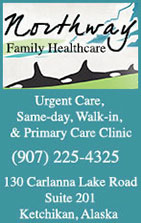
Alaska Nurse Practitioner and Doctor Arrested on Separate Federal Narcotics Charges; Health officials prepare medical response to opioid arrestsPosted & Edited By MARY KAUFFMAN
October 12, 2019
Yesterday's announcement was in response to the arrests Tuesday by Special Agents with the Drug Enforcement Administration of an Anchorage nurse practitioner and a Soldotna doctor on separate federal narcotics charges, which allege that they illegally distributed large amounts of opioids and other powerful narcotics by writing prescriptions for “patients” without medical examinations and lacking medical necessity. Federal law enforcement officials executed multiple search warrants in both cases Tuesday. Alaska’s Chief Medical Officer Dr. Anne Zink said, “The health and well-being of Alaskans is our mission. We are working with local, state, tribal and federal partners to support affected patients, families and the medical community. This includes supporting patients in chronic pain, providing information about pain management, helping to prevent and treat opioid misuse and supporting our community through this transition in care delivery.” Dr. Zink said, “We’re aware of the concerns of both patients and providers and we’re working to address questions and issues as quickly as possible.” According to the Alaska Department of Health and Social Services, while they don’t know exactly how many patients may be affected, they do know that the two arrested providers served approximately 2,000 patients, some of whom traveled from remote communities to visit these providers. Patients and health care providers should also know that the DEA licenses for these two prescribers have been deactivated. That means opioid prescriptions from these prescribers, and in some cases other prescriptions, will not be filled by pharmacies. Arrested Tuesday was Jessica Joyce Spayd, 48, of Anchorage who owns a medical clinic called Eagle River Wellness in Eagle River, Alaska. Spayd is a licensed Advanced Nurse Practitioner specializing in pain management and addiction treatment. Spayd was arrested pursuant to a criminal complaint that charges her with illegally distributing oxycodone, methadone, and hydromorphone. The affidavit in support of the criminal complaint alleges that between 2014 and 2019, Spayd prescribed over 4 million dosage units of opioid narcotics to just over 450 unique “patients” in Alaska, many of whom traveled hundreds of miles from Fairbanks, Utqiagvik, King Salmon and other remote locations to obtain prescriptions. The complaint alleges that Spayd’s unlawful distribution of opioids resulted in the deaths of two patients. Law enforcement agencies continue to investigate Spayd’s prescribing history. Also arrest earlier this week was Dr. Lavern R. Davidhizar, 74, of Soldotna who owns and practices at Family Medical Clinic in Soldotna, Alaska. Davidhizar has been licensed as an Osteopathic Physician since 1978 and holds an Alaska Medical License. Davidhizar was arrested pursuant to a criminal complaint that charges him with illegally distributing controlled substances outside the course of professional practice. The affidavit in support of the criminal complaint alleges that between 2017 and 2019, Davidhizar prescribed over 700,000 narcotic pills. During that time, the leading medications prescribed, but not limited to, were hydrocodone, oxycodone, morphine, methadone, and tramadol. According to the affidavit, drug abusers on the Kenai Peninsula referred to Davidhizar as the “Candy Man” because it was common knowledge that people could obtain pain medication prescriptions from him even though they did not have a legitimate medical need. Law enforcement agencies continue to investigate Davidhizar’s prescribing history. In response to the arrests, U.S. Attorney Bryan Schroder states, “[T]ogether with our partners in law enforcement, we are committed to prosecuting the illegal distribution of controlled substances, whether the crimes are committed by medical professionals or street dealers. The end result of their activities is the same: the creation of addicts, crime, and sometimes death.” Additionally, “[T]he Rural Alaska Anti-Violence Enforcement Network (RAAVEN) represents an ongoing effort to build the capacity of federal, state, and tribal law enforcement in rural Alaska and collaborative public safety and prevention measures with community leaders and local law enforcement officers.” “While facing a frightening opioid drug epidemic, it is truly sad that these two medical professionals would deliberately contribute to this on-going health crisis,” stated DEA Special Agent in Charge Keith Weis. “DEA and its partners will continue to aggressively address illicit drug trafficking throughout the entire State of Alaska under Operation RAAVEN.” If convicted, Spayd faces a mandatory minimum of 20 years to life in federal prison for the most serious charges alleged in the complaint. If convicted, Davidhizar faces a maximum of 20 years imprisonment. The actual sentences imposed will be based upon the seriousness of the offense and the prior criminal history, if any, of the defendants. The U.S. Department of Justice Alaska District reminds the public that charges in a complaint are merely allegations, and the defendants are to be presumed innocent until proven guilty beyond a reasonable doubt in a court of law. If anyone in the public has any further information regarding Spayd or Davidhizar, you are asked to contact the Anchorage Drug Enforcement Administration (DEA) at (907) 271-5033. The Drug Enforcement Administration (DEA) and members of the Alaska Health Care Fraud Task Force, with assistance from the Department of Health and Human Services-Office of the Inspector General, Internal Revenue Service (IRS), U.S. Bureau of Land Management (BLM), Office of Law Enforcement and Security, Department of Natural Resources (DNR), Alaska State Parks Rangers, Alaska State Troopers, Anchorage Police Department, Soldotna Police Department, Kenai Police Department, Alaska Medicaid Fraud Control Unit, and the State of Alaska Division of Insurance conducted the investigations leading to the charges in these cases. The Spayd case is being prosecuted by Assistant U.S. Attorney Ryan D. Tansey. The Davidhizar case is being prosecuted by Assistant U.S. Attorneys Stephen Corso and Jonas Walker. According to the Alaska Department of Health and Social Services, the patients who visited these clinics may have a wide array of medical needs including chronic pain. Moving forward, these patients will need to discuss their options with a health care provider. Patients are encouraged to contact their insurance provider to find a new health care provider, if needed. According to the Alaska Department of Health & Social Services, patients should be aware of the following resources:
The Opioids in Alaska website offers information on opioids education, preventing opioid overdose with naloxone, non-opioid pain management and more. In some cases, anticipation of withdrawal may result in efforts to obtain opioids through other means, and can lead to increased risk-taking and the possibility of overdoses or other medical emergencies. To learn more about how to prevent an opioid overdose, visit the DHSS Project Hope website. If you know someone who you think needs help with a possible substance use disorder, here are some additional informational resources:
Source of News:
|
||||


